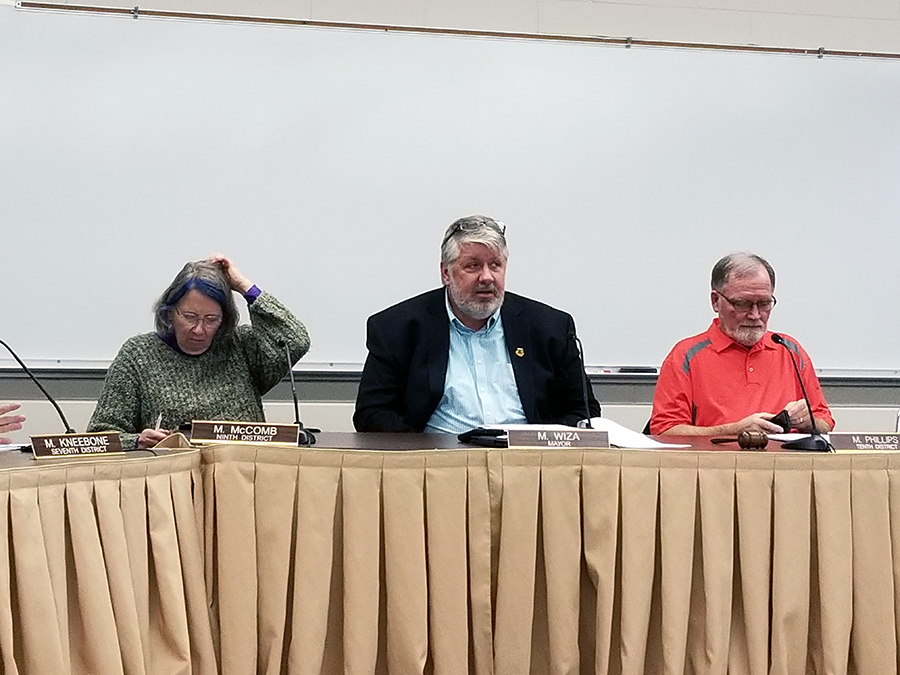Committee Denies Marijuana Fine Reduction; Council to Have Final Say
By Brandi Makuski
The Stevens Point Public Protection Committee on Monday denied a proposal that would reduce the fine amount for first-time marijuana possession.
The measure now moves on to the full City Council on Dec. 18 for a final decision.
Under the ordinance amendment, proposed by Ald. Mary McComb, the fine would be reduced from $100 to $5.
“This ordinance amendment doesn’t legalize anything,” McComb said in her six-minute opening statement during the Dec. 11 committee meeting. “It’s an attempt to further decriminalize adult, private-use of marijuana, which we’ve done already, but this means it’s treated like a minor traffic violation.”
The city moved towards decriminalizing possession of small amounts of marijuana in 2015, then reducing the $300 fine to $100 for first offenders caught with up to five grams. McComb’s proposal would reduce the fine even further, totaling about $67 after court fees are assessed.
By comparison, a first-offense marijuana possession in Portage Co. is $389.50, and $187 in the Village of Plover.
McComb argued marijuana was the “third most popular recreational drug in the United States,” also saying her research found about 100 million people in the country have tried marijuana, with 14 million using the drug on a regular basis.
“I think there are disagreements about this, but it seems to be mostly regarded as a soft drug, which would put it in the category with alcohol and tobacco,” she said. “Unless it’s harming other people I would argue it’s a health matter, and that it’s alright for adults to use marijuana privately.”
“I believe we need to get real about accepting marijuana’s place in our culture, because it is already there in our culture,” she added.
Councilwoman Cathy Dugan asked McComb if she’d uncovered any contradictory evidence, saying “there must be another side” to the argument.
“I’m not a scientific researcher,” McComb replied, but added there studies did exist indicating marijuana was indeed a gateway drug, leading to more lethal substances like heroin and cocaine.
Council President Meleesa Johnson agreed with McComb’s proposal, saying opioids were far more likely to lead to hard drug addictions, adding, “I firmly believe marijuana is not a direct gateway, nor do I believe alcohol is.”
But despite the passion offered by proponents on Monday, Police Chief Martin Skibba pointed out that marijuana is still illegal under state law, and a second offense is a felony charge.
“Fines are meant to be a deterrent from a particular behavior, and a $5 fine isn’t a deterrent; it’s equivalent to smoking in a public place – even two persons riding [the same] bicycle is a $10 fine,” Skibba said. “If we reduce the fee so low that it’s no longer a deterrent, you will have more people being arrested and convicted of felonies.”
Skibba said there are also other factors he believes aren’t being considered in the local legalization debate.
“Today’s marijuana is engineered; it’s completely different than what was smoked back in the ’60s,” he said, adding while many states have already legalized marijuana, they have also experienced subsequent increases in other crimes, such as hard drugs, trafficking and prostitution.
A written statement from Portage Co. Health Officer Gary Garske was also entered into the record, citing concerns about proposal because it created “a culture of acceptance similar to that of alcohol, especially among youth in our community.”
But opinions were mixed on both the committee and in the public.
“The majority of marijuana users are otherwise law-abiding citizens,” said Ben Kollock, a cancer survivor and local marijuana advocate. “The punishment should fit the crime; if the goal of having $100 fine is to reduce or eliminate people using it, then the strategy has failed miserably. Decriminalizing marijuana is the will of the voters.”
Others, like resident John Quirk, pointed out the proposal wasn’t in line with other fines in city government.
“I just want to remind everything that we, on a regular basis, charge people $160 fine for leaving a couch on the curb,” Quirk said. “And now you’re talking about dropping the fine for an illegal activity that’s a step away from a felony to five dollars?”
Ald. Shaun Morrow said he has a unique perspective on the matter due to his career with the Wisconsin Dept. of Probation and Parole. While he believes marijuana will eventually become legal in the state, until that happens he thinks the city’s rules should be in keeping with state law.
“I see kids who think weed is an ordinance problem, and then they get busted again and they’re in my office for a felony charge,” he said. “We should not encourage others to break the law…this is going to be setting people up to have larger legal bills, maybe go to prison.”
Councilman Mike Phillips agreed, saying he believed at least 90 percent of constituents in his district would not want any changes to the city’s ordinances.
“We’re going backwards,” Phillips said.
Committee Chair Heidi Oberstadt said she felt the change was “pushing the limits of our authority” on the council, and she would rely on experts to help her decide.
The committee voted 3-2 against the ordinance amendment, with committee members Oberstadt, Phillips and Dugan against, and Johnson and McComb in favor.
The full City Council meets at 7 PM on the second floor of the County-City Building, 1519 Church Street. The public is welcome to attend.


